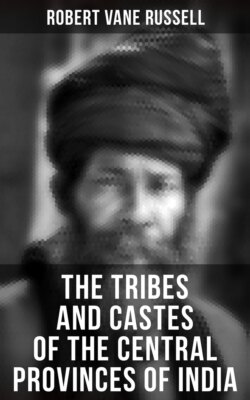Читать книгу The Tribes and Castes of the Central Provinces of India - Robert Vane Russell - Страница 35
На сайте Литреса книга снята с продажи.
Arakh
ОглавлениеTable of Contents
Arakh.—A small caste of cultivators and labourers found principally in the Chānda District and Berār and scattered over other localities. The Arakhs are considered to be an offshoot of the Pāsi or Bahelia caste of hunters and fowlers. Mr. Crooke1 writes of them: “All their traditions connect them with the Pāsis and Parasurāma, the sixth Avatāra of Vishnu. One story runs that Parasurāma was bathing in the sea, when a leech bit his foot and caused it to bleed. He divided the blood into two parts; out of one part he made the first Pāsi and out of the second the first Arakh. Another story is that the Pāsis were made out of the sweat (pasīna) of Parasurāma. While Parasurāma was away the Pāsi shot some animals with his bow, and the deity was so enraged that he cursed the Pāsi, and swore that his descendants should keep pigs. This accounts for the degradation of the Pāsis. Subsequently Parasurāma sent for some Pāsis to help him in one of his wars; but they ran away and hid in an arhar2 field and were hence called Arakhs.” This connection with the Pāsis is also recognised in the case of the Arakhs of Berār, of whom Mr. Kitts writes:3 “The Arakhs found in Morsi are a race akin to the Bahelias. Their regular occupation is bird-catching and shikār (hunting). They do not follow Hindu customs in their marriages, but although they keep pigs, eat flesh and drink spirits, they will not touch a Chamār. They appear to be a branch of the Pāsi tribe, and are described as a semi-Hinduised class of aborigines.” In the Chānda District, however, the Arakhs are closely connected with the Gond tribe, as is evident from their system of exogamy. Thus they say that they are divided into the Mātia, Tekām, Tesli, Godām, Madai, Sayām and Chorliu septs, worshipping respectively three, four, five, six, seven, eight and twelve gods; and persons who worship the same number of gods cannot marry with one another. This system of divisions according to the different number of gods worshipped is found in the Central Provinces only among the Gonds and one or two other tribes like the Baigas, who have adopted it from them, and as some of the names given above are also Gondi words, no doubt need be entertained that the Arakhs of Chānda are largely of Gond descent. They are probably, in fact, the offspring of irregular connections between the Gonds and Pāsis, who, being both frequenters of the forests, would naturally come much into contact with each other. And being disowned by the true Pāsis on account of their defective pedigree, they have apparently set up as a separate caste and adopted the name of Arakh to hide the deficiencies of their ancestry.
The social customs of the Arakhs resemble those of other low Hindu castes, and need not be given in detail. Their weddings are held near a temple of Māroti, or if there be none such, then at the place where the Holi fire was lit in the preceding year. A bride-price varying from Rs. 25 to Rs. 40 is usually paid. In the case of the marriage of a widow, the second husband goes to the house of the woman, where the couple are bathed and seated on two wooden boards, a branch of a cotton-plant being placed near them. The bridegroom then ties five strings of black glass beads round the woman’s neck. The dead are mourned for one day only, and a funeral feast is given to the caste-fellows. The Arakhs are a very low caste, but their touch does not convey impurity.
1 Tribes and Castes, art. Arakh.
2 Cajanus indicus.
3 Berār Census Report (1881), p. 157.
